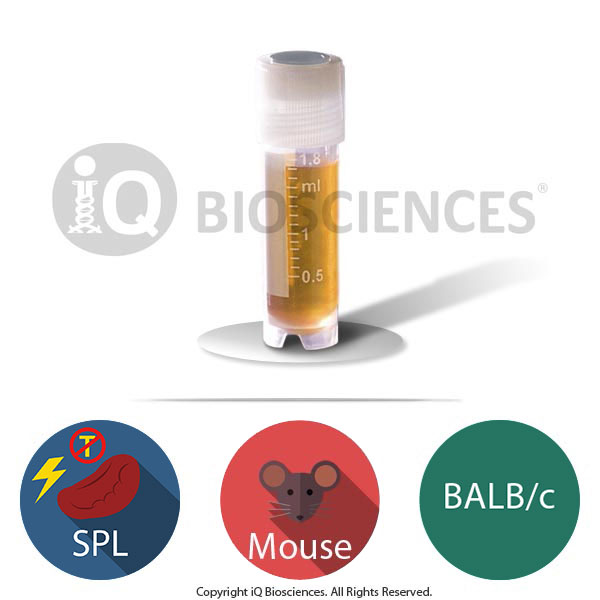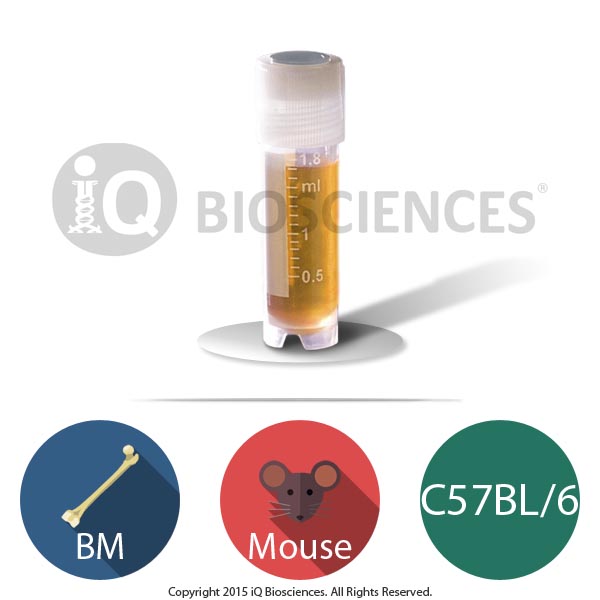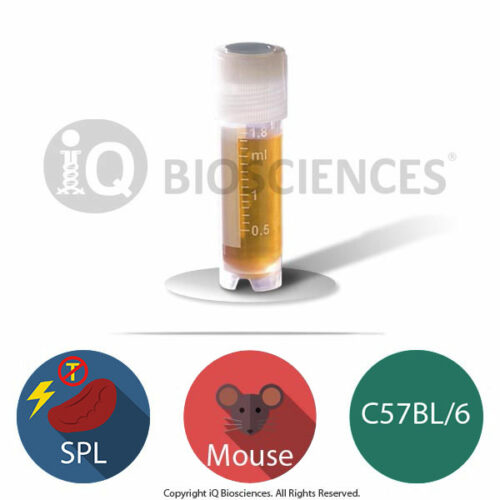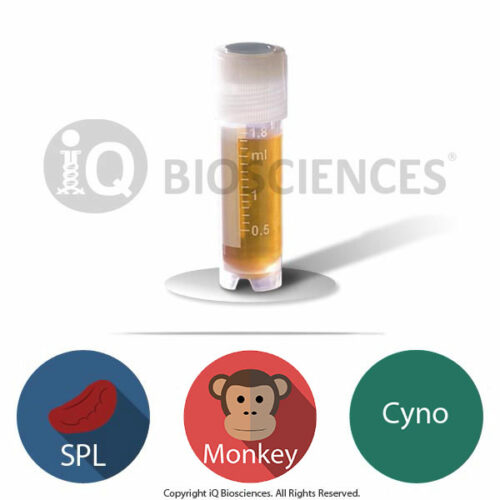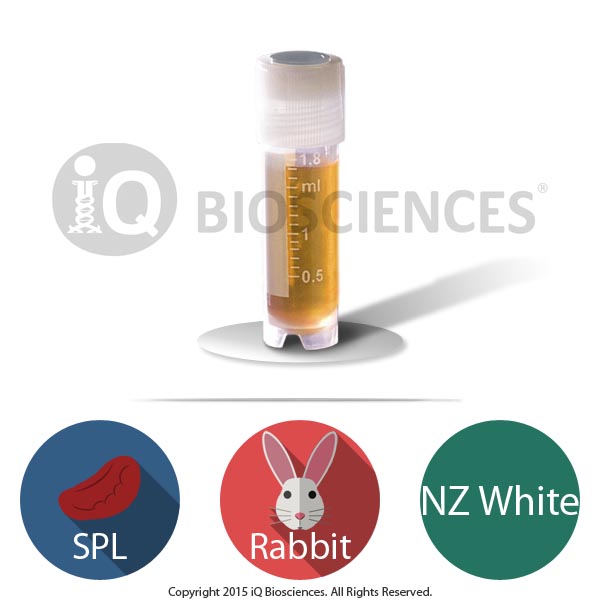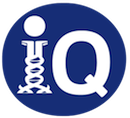- High-quality irradiated splenocytes depleted of T cells from the BALB/c mouse, one of the most commonly-used inbred mouse strains
- Used for a wide variety of immunology-based applications, including proliferation and cytotoxicity studies
- All orders come with an iQ Certificate of Analysis
- Normally ships out same business day
BALB/c Mouse T Cell-depleted Irradiated Splenocytes
$485.00 – $780.00
Description
About the BALB/c Mouse
The BALB/c mouse is a commonly-used inbred mouse strain for the study of autoimmune diseases and pathogen-driven immune response. They carry the H-2d haplotype and their immune cells are routinely used in immune-based assays. Based on early studies, the BALB/c mouse is biased towards a Th2 antibody-mediated immune response when challenged appropriately. Thus, the BALB/c mouse is well-studied in the field of immunology and their cells (like BALB/c mouse splenocytes) may offer experimental advantages depending on the parameters of your experiments.
Application Summary for BALB/c Mouse T Cell-depleted Irradiated Splenocytes
Irradiated mouse splenocytes depleted of T cells can be used as antigen presenting cells, stimulation/feeder cells or target cells in a wide variety of immunology-based applications. Unlike unirradiated cells, these cells will not divide or respond to stimulus. However, the antigen presenting cells found in the splenic population, such as dendritic cells, macrophages, and B cells, can present antigenic peptide to stimulate exogenously added CD4 and CD8 T cells, such as those from T cell receptor (TCR) transgenic mice whose T cells bear only one TCR of known specificity. In these types of co-culture studies that require antigen presentation, peptide is added to the irradiated cells, which present the peptide to activate the T cells to produce cytokine, proliferate, and perform cytotoxicity on the irradiated cells.
Irradiated splenocytes can also be used as stimulator cells in mixed lymphocyte reactions (MLR). In these type of experiments, the irradiated cells and exogenously added effector cells, which are typically T cells, are of different genetic backgrounds, in particular, they are of different MHC haplotypes. The effector cells will respond to the difference in the MHC haplotype and begin to produce cytokines, proliferate, and perform cytotoxicity.
In some cases, these experiments will require irradiated cells that do have not have contaminating T cells that may interfere with the procedure and/or readout. Therefore, iQ offers a line of irradiated of splenocytes in which the T cells have been removed to prevent any of those issues.
Isolation of T Cell-depleted Splenocytes
Spleen Collection, Splenocyte Isolation, and T Cell Depletion
Spleens are isolated responsibly from BALB/c mice at third party facilities. These facilities are vetted to ensure they operate according to local regulations and laws. Since the facility is local, the tissue is quickly transported to iQ’s facility for processing.
Once at our facility, the splenic tissue is carefully dissociated through a gentle mechanical process to generate a single cell suspension under sterile conditions. The suspension is then carefully passed through a filter to remove any fat and/or connective tissue and subsequently depleted of red blood cells in a manner that is not damaging to splenic cells.
To remove T cells, splenocytes underwent magnetic isolation that separated T cells from the rest of the splenic populations. Post-isolation analysis by flow cytometry showed <10% T cell contamination, demonstrating an enriched splenic sample lacking T cells.
Irradiation of Splenocytes
After obtaining T cell-depleted splenocytes, the cells are irradiated using X-ray radiation at a dosage that stops cell division, but permits retention of cellular processes, including antigen processing and presentation. The irradiation is performed at a world class institution that abides by state and federal regulations regarding radioactive usage.
Cryopreservation and Storage
Our BALB/c mouse T cell-depleted irradiated splenocytes are cryopreserved carefully using iQ Biosciences’ cryopreservation protocol that ensures high viability (typically > 70%) after thawing.
Cells should be stored at < -120°C once they are received, such as within a liquid nitrogen tank (vapor phase).
Additional information
| Available Size(s) | |
|---|---|
| Cell Type | |
| Format | |
| Species | |
| Tissue Type | |
| Viability | Typically > 70% |
For US customers, we ship via FedEx Overnight Shipping. Shipping charges will vary per shipping address (based on ZIP code) and are estimated to be $140.
For international (non-US) customers, we work closely with you and our couriers to ensure all necessary documentation is in place for international shipments to significantly reduce the chance of delays at Customs. For the export of non-human primate samples, this includes preparing CITES permits, as well as any other documentation as required by country. Please submit an inquiry to orders@iqbiosciences.com for your estimated time of delivery and shipping charges.
Austria
Hölzel Diagnostika Handels GmbH
Tel: +49 221 126 02 66
Email: info@hoelzel.de
Web: https://www.hoelzel-biotech.com/
Canada
Cedarlane
Tel: +1 (289) 288-0001
Toll Free (North America): +1 (800) 268-5058
Fax: +1 (289) 288-0020
Email: sales@cedarlanelabs.com
Web: https://www.cedarlanelabs.com
China
BIOHUB INTERNATIONAL TRADE CO., LTD.
上海起发实验试剂有限公司
Address: Chuansha Rd #6619, Pudong, Shanghai, Zipcode: 201200 P.R.China
Tel: 0086-021-50724187
Phone: +86-15921799099
Fax: 0086-021-50724961
Email: sale3@78bio.com
Web: www.qfbio.com
European Union
Caltag Medsystems Ltd.
Email: office@caltagmedsystems.co.uk
Web: https://www.caltagmedsystems.co.uk
tebu-bio
Web: https://www.tebu-bio.com
Or Find a local contact
Germany
Hölzel Diagnostika Handels GmbH
Tel: +49 221 126 02 66
Email: info@hoelzel.de
Web: https://www.hoelzel-biotech.com/
Zageno
Web: https://zageno.com/
Ireland
2B Scientific Ltd
Tel: +44(0) 1869 238033
Fax: +44(0) 1869 238034
Email: sales@2BScientific.com
Web: https://www.2bscientific.com
India
Cell & Gene BioSolutions Pvt. Ltd.
#478 C, SLV Complex, Raghavendra Swamy Mutt Road
Opp. Turahalli Water Tank, Turahalli, Subramanyapura Post
Uttarahalli Hobli, Bengaluru-560061, Karnataka, India
Phone: +91 97317 14670
Phone: +91 98809 25033
Email: info@cgbios.com
Web: www.cgbios.com
Japan
Cosmo Bio Co., Ltd.
Tel: +81 (03) 5632 9610
Fax: +81 (03) 5632 9619
Email: nsmail@cosmobio.co.jp
Web: https://www.cosmobio.co.jp
Qatar
Sedeer Medical Services and Trading LLC
Tel: +974 4434 9191
Email: info@sedeer.com
Web: https://sedeer.com/
Singapore
Omnicell Pte Ltd
Tel: +65 6747 0201
Email: enquiry@omnicell.com.sg
Web: https://omnicell.com.sg/</a
South Korea
BioClone
Tel: +82-2-2690-0058
Email: bioclone@bioclone.co.kr
Web: http://www.bioclone.co.kr
Switzerland
Hölzel Diagnostika Handels GmbH
Tel: +49 221 126 02 66
Email: info@hoelzel.de
Web: https://www.hoelzel-biotech.com/
Taiwan
Hycell International Co. Ltd.
Tel: +886-2-2877-1122
Fax: +886-2-2876-1520
Web: http://www.hycell.com.tw
United Kingdom
2B Scientific Ltd
Tel: +44(0) 1869 238033
Fax: +44(0) 1869 238034
Email: sales@2BScientific.com
Web: https://www.2bscientific.com
Caltag Medsystems Ltd.
Tel: +44 (0)1280 827460
Fax: +44 (0)1280 827466
Email: office@caltagmedsystems.co.uk
Web: https://www.caltagmedsystems.co.uk
tebu-bio
Tel: +44 (0)1733 421880
Fax: +44 (0)1733 421882
Email: uk@tebu-bio.com
Web: https://www.tebu-bio.com
Zageno
Web: https://zageno.com/
United States
Fisher Scientific
Tel: 1-800-766-7000
Web: https://www.fishersci.com
Quartzy
Web: https://www.quartzy.com
VWR International
Tel: 1-800-932-5000
Web: https://www.vwr.com
Zageno
Web: https://zageno.com/
